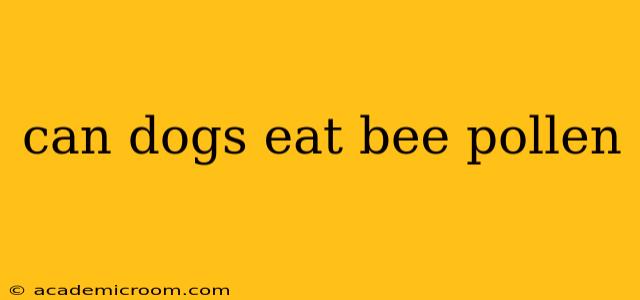Can Dogs Eat Bee Pollen? A Comprehensive Guide for Pet Owners
The question of whether dogs can eat bee pollen is a common one among pet owners. The short answer is: it's complicated, and the best approach is usually to err on the side of caution. While bee pollen offers numerous health benefits for humans, its impact on dogs is less clear-cut and potentially risky. Let's delve deeper into the potential benefits, risks, and best practices.
What is Bee Pollen?
Bee pollen is a mixture of pollen, nectar, bee saliva, and other beehive secretions. It's often touted as a nutritional powerhouse, rich in vitamins, minerals, proteins, and antioxidants. Humans consume it for a variety of purported health benefits, ranging from boosting energy to improving immune function. However, it's crucial to remember that the canine digestive system differs significantly from a human's.
Potential Benefits of Bee Pollen for Dogs (Limited Evidence)
While some proponents suggest bee pollen might offer some benefits for dogs, including increased energy and improved coat condition, scientific evidence supporting these claims is extremely limited. Any observed improvements could be coincidental or due to other factors in the dog's diet and lifestyle. It's vital to avoid making assumptions based on anecdotal evidence.
Risks of Feeding Bee Pollen to Dogs
The potential risks of feeding bee pollen to dogs significantly outweigh any purported benefits. Here are key concerns:
-
Allergies: Dogs, like humans, can be allergic to bee pollen. Even a small amount can trigger a severe allergic reaction, ranging from mild skin irritation to life-threatening anaphylaxis. Symptoms might include itching, hives, vomiting, diarrhea, swelling, and difficulty breathing.
-
Digestive Upset: Bee pollen can cause digestive upset in some dogs, leading to vomiting, diarrhea, or gas. This is particularly true if the dog consumes a large quantity.
-
Contamination: Bee pollen can be contaminated with pesticides, herbicides, or other harmful substances if not sourced responsibly. This risk is amplified by the fact that there's less stringent regulation on bee pollen intended for animal consumption than that intended for humans.
-
Interaction with Medications: Bee pollen might interact negatively with certain medications your dog is taking. Always consult your veterinarian before introducing any new supplements or foods to your dog's diet, especially if they are on prescription medication.
What if My Dog Ate Bee Pollen?
If your dog accidentally ingested bee pollen, monitor them closely for any signs of an allergic reaction or digestive upset. These symptoms can manifest within minutes to hours. If you observe any adverse reactions, contact your veterinarian immediately. Early intervention is crucial in managing allergic reactions.
Can Bee Pollen Cause Weight Gain in Dogs?
While bee pollen itself isn't inherently fattening, introducing any new food into a dog's diet can potentially contribute to weight gain if not managed carefully. It's essential to maintain a balanced diet and adjust calorie intake accordingly if you decide to introduce any supplements, including bee pollen. Consult your vet about adjusting your dog's diet if weight management is a concern.
Is Bee Pollen Safe for Puppies?
Puppies have more sensitive digestive systems than adult dogs. Therefore, introducing bee pollen to a puppy's diet carries a higher risk of digestive upset and allergic reactions. It's strongly advised to avoid giving bee pollen to puppies altogether.
What are the Alternatives to Bee Pollen for Dogs?
Instead of relying on bee pollen, focus on providing your dog with a balanced and nutritious diet that meets their specific needs. High-quality dog food, fresh fruits and vegetables (always check for safe options), and regular exercise are crucial for your dog's health and well-being. If you have concerns about your dog's health or nutritional needs, consult your veterinarian for personalized advice. They can help you create a tailored plan to support optimal canine health.
